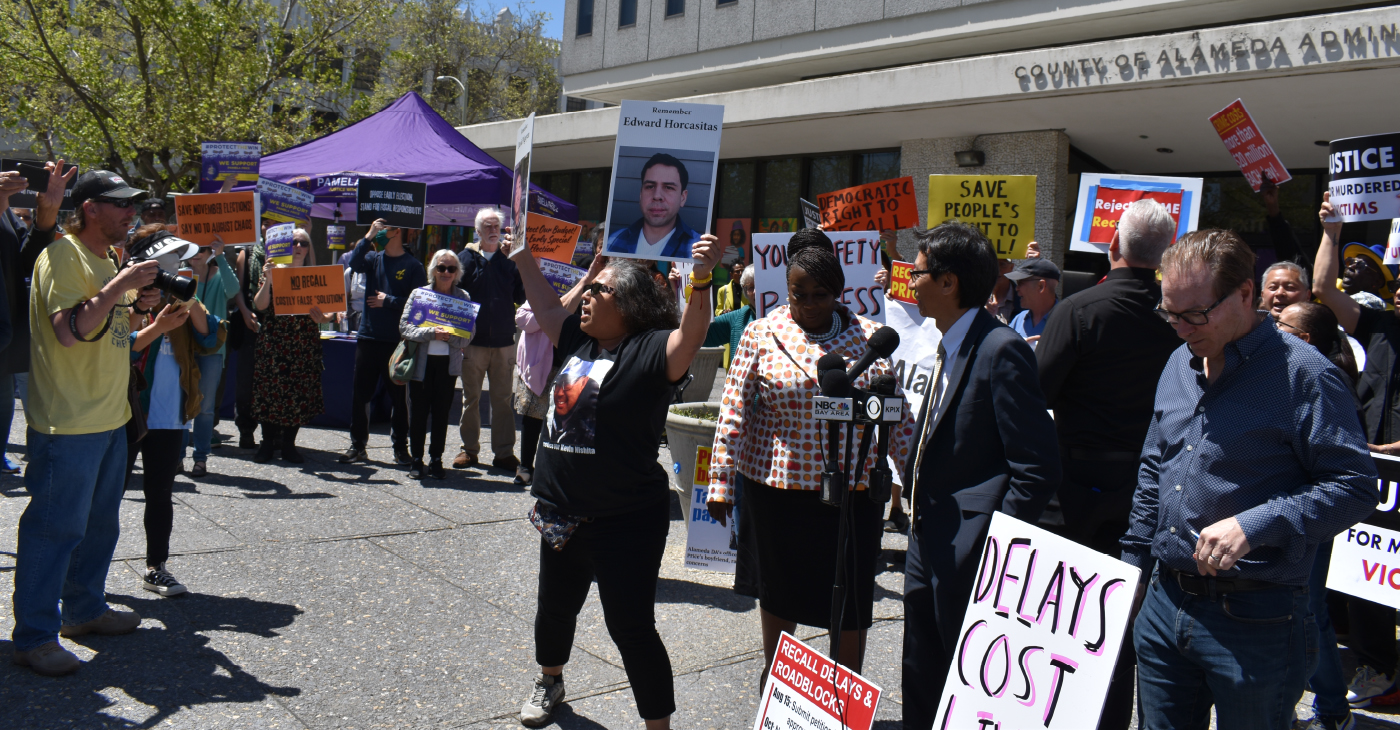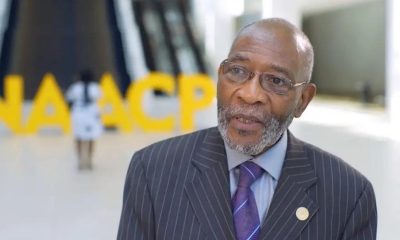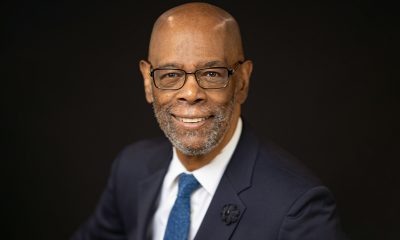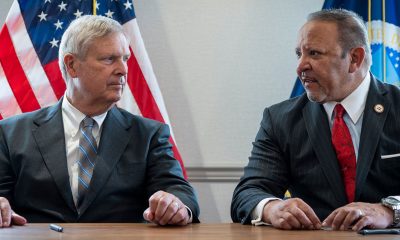Politics
N.C. NAACP Will Seek to Get Voter Restrictions Lifted
By Freddie Allen
Senior Washington Correspondent
WASHINGTON (NNPA) – In less than a week, a voting rights trial is expected to begin that will challenge North Carolina’s restrictive voting law. Whatever the verdict, experts expect the ruling to have a ripple effect in states that have passed similar laws in the wake of a recent Supreme Court decision that weakened the Voting Rights Act.
Shortly after the Supreme Court invalidated Section 4 of the Voting Rights Act in the Shelby v. Holder decision two years ago, a number of states rushed to pass voting laws that civil rights groups say discriminate against people of color and poor people.
In its decision, the Supreme Court voted to annihilate the Voting Rights Act that required jurisdictions with a demonstrated history of racial discrimination to pre-clear any election law change with the U.S. Attorney General or a district federal judge in Washington, D.C.
Rev. William Barber II, the head of the North Carolina branch of the NAACP and co-founder of the Moral Mondays Movement, said that the deliberate, race-based voter suppression law passed by the North Carolina state legislature and signed by North Carolina’s Gov. Pat McCrory is a sin.
“[House Bill 589] violates our deepest constitutional values and our deepest moral and religious values, which demand equal protection under the law and the establishment of justice,” said Barber.
The Advancement Project, a multi-racial civil rights group, called H.B. 589 a “monster” bill that shortens the early voting period by a full week, eliminates same-day registration and requires strict forms of voter ID, changes that disproportionately affect minority and low-income voters.
The bill also blocks out-of-precinct voting, expands the role of voter challengers at the polls, and ends a pre-registration program for 16- and 17-year olds, according to the advocacy group.
“The number of voters silenced because of the new law likely exceeds 30,000 and could reach 50,000 or more,” according to analysis by Democracy North Carolina, a watchdog group that monitors elections.
The report said that the repeal of same-day registration, out-of-precinct voting, and straight party voting “which created backlogs inside the voting enclosure and longer lines outside as voters took longer to mark each contest on their ballot,” created the most problems for voters during the 2014 general election in North Carolina.
As the nation mourns the mass murder of the nine members of Emanuel African Methodist Episcopal Church in Charleston S.C., Barber said that Americans are in “the middle of a serious season about race” and that it’s not just about symbols like the Confederate flag it’s also about the substance of public policy and the racially disparate impact of that the public policy.
“The fact that the extreme agenda around voter suppression has been so racialized and framed by the suppressors as somehow saving the country and saving the democracy is the reason that, not only must flags come down, but the opposition to voting rights and these suppressive laws must come down,” said Barber. “Racialized rhetoric and policy rooted in untruth creates a climate in which we can say, ‘the perpetrator of race-based terror has been arrested, but the killer, racism and race-driven policies and rhetoric, is still at large.’”
Donita Judge, a senior attorney for Advancement Project, said that group will also show that the North Carolina general assembly knew that the law would discriminate against African American voters, making it harder for them to participate in the electoral process, but passed it anyway.
Judge said that the lawyers representing the North Carolina branch of NAACP in the lawsuit against Gov. McCrory plan to use Section 2 of the Voting Rights Act that prohibits voting laws that result in the denial or abridgement of voting on the basis of race to challenge H.B. 589.
“The outcome of this trial will have national implications for voting rights,” said Judge, adding that dozens of states have passed similar legislation after Shelby v. Holder decision. “The solvency of the Voting Rights Act to stop these discriminatory voting practices hangs in the balance and that battle will be waged in Winston-Salem starting July 13.”
In June, less than a month before the trial, North Carolina legislators eased restrictions on the photo ID requirements in the state’s contentious voting law. The changes, if approved by Gov. McCrory, would allow voters to sign an affidavit acknowledging hardships that they encountered in obtaining a photo ID. Voters could then present other forms of identification.
Barber noted that the last ditch effort by state lawmakers to soften the blow of the photo ID statute, only addressed one part of the 2013 law, leaving the cuts to early voting days, same day registration and pre-registration for some teenagers intact.
The same day that the trial is set to begin, the Moral Mondays movement will also host a march and rally for voting rights in Winston-Salem, N.C., Barber said, to show the world that North Carolina residents plan to fight for their right to vote.
“This is our Selma, and we implore all who care about voting rights to join us,” said Barber.
“Selma is not just something that happened 50 years ago. Selma is not just a movie that you can go see to be nostalgic about the fight that was. Our Selma is the fight that is. The fight against voter suppression right now, right here, today.”
###
Activism
S.F. Black Leaders Rally to Protest, Discuss ‘Epidemic’ of Racial Slurs Against Black Students in SF Public School System
Parents at the meeting spoke of their children as no longer feeling safe in school because of bullying and discrimination. Parents also said that reported incidents such as racial slurs and intimidation are not dealt with to their satisfaction and feel ignored.

By Carla Thomas
San Francisco’s Third Baptist Church hosted a rally and meeting Sunday to discuss hatred toward African American students of the San Francisco Unified School District (SFUSD).
Rev. Amos C. Brown, president of the San Francisco NAACP and pastor of Third Baptist Church, along with leadership from local civil rights groups, the city’s faith-based community and Black community leadership convened at the church.
“There has been an epidemic of racial slurs and mistreatment of Black children in our public schools in the city,” said Brown. “This will not be tolerated.”
According to civil rights advocate Mattie Scott, students from elementary to high school have reported an extraordinary amount of racial slurs directed at them.
“There is a surge of overt racism in the schools, and our children should not be subjected to this,” said Scott. “Students are in school to learn, develop, and grow, not be hated on,” said Scott. “The parents of the children feel they have not received the support necessary to protect their children.”
Attendees were briefed last Friday in a meeting with SFUSD Superintendent Dr. Matt Wayne.
SFUSD states that their policies protect children and they are not at liberty to publicly discuss the issues to protect the children’s privacy.
Parents at the meeting spoke of their children as no longer feeling safe in school because of bullying and discrimination. Parents also said that reported incidents such as racial slurs and intimidation are not dealt with to their satisfaction and feel ignored.
Some parents said they have removed their students from school while other parents and community leaders called on the removal of the SFUSD superintendent, the firing of certain school principals and the need for more supportive school board members.
Community advocates discussed boycotting the schools and creating Freedom Schools led by Black leaders and educators, reassuring parents that their child’s wellbeing and education are the highest priority and youth are not to be disrupted by racism or policies that don’t support them.
Virginia Marshall, chair of the San Francisco NAACP’s education committee, offered encouragement to the parents and students in attendance while also announcing an upcoming May 14 school board meeting to demand accountability over their mistreatment.
“I’m urging anyone that cares about our students to pack the May 14 school board meeting,” said Marshall.
This resource was supported in whole or in part by funding provided by the State of California, administered by the California State Library via California Black Media as part of the Stop the Hate Program. The program is supported by partnership with California Department of Social Services and the California Commission on Asian and Pacific Islander American Affairs as part of the Stop the Hate program. To report a hate incident or hate crime and get support, go to CA vs Hate.
Alameda County
Board of Supervisors Accepts Certification of Signatures, Will Schedule Recall Election May 14
The Alameda Board of Supervisors unanimously accepted the certification of the results of the valid signatures submitted for the recall of District Attorney Pamela Price on Tuesday evening. The Board will set the election date at a special meeting on May 14. Before the meeting, recall proponents and opponents held separate press conferences to plead their cases to the Board and residents of Alameda County.

By Magaly Muñoz
The Alameda Board of Supervisors unanimously accepted the certification of the results of the valid signatures submitted for the recall of District Attorney Pamela Price on Tuesday evening. The Board will set the election date at a special meeting on May 14.
Before the meeting, recall proponents and opponents held separate press conferences to plead their cases to the Board and residents of Alameda County.
Price, who up until this point has made little public comment about the recall, held her press conference in Jack London to announce that the California Fair Political Practices Commission has opened an investigation into the finances of the Save Alameda For Everyone (SAFE) recall campaign.
The political action committee (PAC), Reviving the Bay Area, has been the largest contributor to the SAFE organization and has allegedly donated over half a million dollars to the recall efforts.
“Between September 2023 and November 2023, [Revive the Bay Area] donated approximately $578,000 to SAFE without complying with the laws that govern all political committees in California,” Price said.
Price accused the recall campaigns of using irregular signature-gathering processes, such as paying gatherers per signature, and using misleading information to get people to sign their petitions.
SAFE held their own press conference outside of the Alameda County Administration Building at 1221 Oak St. in Oakland, once again calling for the Board to certify their signatures and set a date for the recall election.
Their press conference turned contentious quickly as Price’s “Protect the Win” supporters attempted to yell over the SAFE staff and volunteers. “Stop scapegoating Price” and “Recall Price” chants went on for several moments at a time during this event.
Families of victims urged the Board to think of their loved ones whose lives are worth much more than the millions of dollars that many opponents of the recall say is too much to spend on a special election.
The Registrar of Voters (ROV) estimates the special election could cost anywhere from $15 to $20 million, an amount that is not in their budget.
The Board was presented with several options on when and how to conduct the recall election. They have to set a date no less than 88 days or more than 125 days after May 14, meaning the date could fall anywhere from late July to September.
But the County charter also states that if a general election takes place within 180 days of their scheduling deadline, the Board could choose to use the November ballot as a way to consolidate the two events.
In the event that Price is recalled, the Supervisors would appoint someone to fill the vacancy, though neither the County nor the California charter specifies how long they would have to pick a replacement.
The appointee would serve as district attorney spot until the next election in 2026. Afterwards, either they, if they run and win, or a newly elected candidate would serve the rest of Price’s six-year term until 2029. Price is unique as the only district attorney wo serves a term of six years.
The Board acknowledged that they knew last fall that this recall would come with its own set of complications when Measure B, which changed the local recall charter to match California’s, was first brought to their consideration.
Supervisors Nate Miley and David Haubert opposed discussing the measure, stating that the public would think that the Board was attempting to influence the recall campaign that had already taken off months prior.
“I think ultimately this feels like it’s going to end up in court, one way or the other, depending on who files what,” Haubert said.
Price’s legal team told the Post that the district attorney intended to consider all legal options should the recall election take place.
Miley stated that while he was in support of the amendment to the charter, he did not think it was right to schedule it for the March ballot as it would ultimately cause confusion for everyone involved.
“It has produced some legal entanglements that I think, potentially, could’ve been avoided,” Miley said.
Commentary
Opinion: Lessons for Current Student Protesters From a San Francisco State Strike Veteran
How the nation’s first College of Ethnic studies came about, bringing together Latino, African American and Asian American disciplines may offer some clues as to how to ease the current turmoil on American college campuses over the Israel-Hamas war. After the deadline passed to end the Columbia University encampment by 2 p.m. Monday, student protesters blockaded and occupied Hamilton Hall in a symbolic move early Tuesday morning. Protesters did the same in 1968.

By Emil Guillermo
How the nation’s first College of Ethnic studies came about, bringing together Latino, African American and Asian American disciplines may offer some clues as to how to ease the current turmoil on American college campuses over the Israel-Hamas war.
After the deadline passed to end the Columbia University encampment by 2 p.m. Monday, student protesters blockaded and occupied Hamilton Hall in a symbolic move early Tuesday morning.
Protesters did the same in 1968.
That made me think of San Francisco State University, 1968.
The news was filled with call backs to practically every student protest in the past six decades as arrests mounted into hundreds on nearly two dozen campuses around the country.
In 1970, the protests at Kent State were over the Vietnam War. Ohio National Guardsmen came in, opened fire, and killed four students.
Less than two weeks later that year, civil rights activists outside a dormitory at Jackson State were confronted by armed police. Two African American students were killed, twelve injured.
But again, I didn’t hear anyone mention San Francisco State University, 1968.
That protest addressed all the issues of the day and more. The student strike at SFSU was against the Vietnam war.
That final goal was eventually achieved, but there was violence, sparked mostly by “outside agitators,” who were confronted by police.
“People used the term ‘off the pigs’ but it was more rally rhetoric than a call to action (to actually kill police),” said Daniel Phil Gonzales, who was one of the strikers in 1968.
Gonzales, known as the go-to resource among Filipino American scholars for decades, went on to teach at what was the positive outcome of the strike, San Francisco State University’s College of Ethnic Studies. It’s believed to be the first of its kind in the nation. Gonzales recently retired after more than 50 years as professor.
As for today’s protests, Gonzales is dismayed that the students have constantly dealt with charges of antisemitism.
“It stymies conversation and encourages further polarization and the possibility of violent confrontation,” he said. “You’re going to be labeled pro-Hamas or pro-terrorist.”
That’s happening now. But we forget we are dealing not with Hamas proxies. We are dealing with students.
Gonzales said that was a key lesson at SF State’s strike. The main coalition driving the strike was aided by self-policing from inside of the movement. “That’s very difficult to maintain. Once you start this kind of activity, you don’t know who’s going to join,” he said.
Gonzales believes that in the current situation, there is a patch of humanity, common ground, where one can be both pro-Palestine and pro-Israel. He said it’s made difficult if you stand against the belligerent policies of Benjamin Netanyahu. In that case, you’re likely to be labeled antisemitic.
Despite that, Gonzales is in solidarity with the protesters and the people of Gaza, generally. Not Hamas. And he sees how most of the young people protesting are in shock at what he called the “duration of the absolute inhumane kind of persecution and prosecution of the Palestinians carried out by the Israeli government.”
As a survivor of campus protest decades ago, Gonzales offered some advice to the student protesters of 2024.
“You have to have a definable goal, but right now the path to that goal is unclear,” he said.
About the Author
Emil Guillermo is a journalist and commentator. A veteran newsman in TV and print, he is a former host of NPR’s “All Things Considered.”
-

 Community3 weeks ago
Community3 weeks agoFinancial Assistance Bill for Descendants of Enslaved Persons to Help Them Purchase, Own, or Maintain a Home
-

 Activism4 weeks ago
Activism4 weeks agoOakland Post: Week of April 3 – 6, 2024
-

 Business3 weeks ago
Business3 weeks agoV.P. Kamala Harris: Americans With Criminal Records Will Soon Be Eligible for SBA Loans
-

 Activism3 weeks ago
Activism3 weeks agoOakland Post: Week of April 10 – 16, 2024
-

 Community3 weeks ago
Community3 weeks agoAG Bonta Says Oakland School Leaders Should Comply with State Laws to Avoid ‘Disparate Harm’ When Closing or Merging Schools
-

 Community2 weeks ago
Community2 weeks agoOakland WNBA Player to be Inducted Into Hall of Fame
-

 Community2 weeks ago
Community2 weeks agoRichmond Nonprofit Helps Ex-Felons Get Back on Their Feet
-

 Community2 weeks ago
Community2 weeks agoRPAL to Rename Technology Center for Retired Police Captain Arthur Lee Johnson
























































